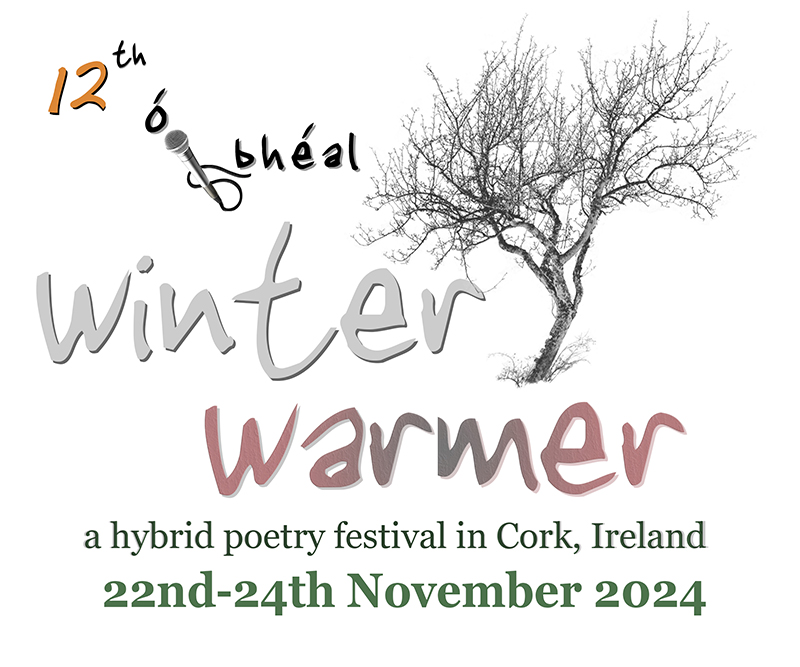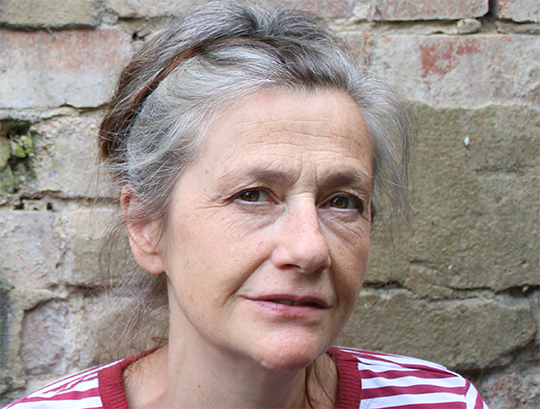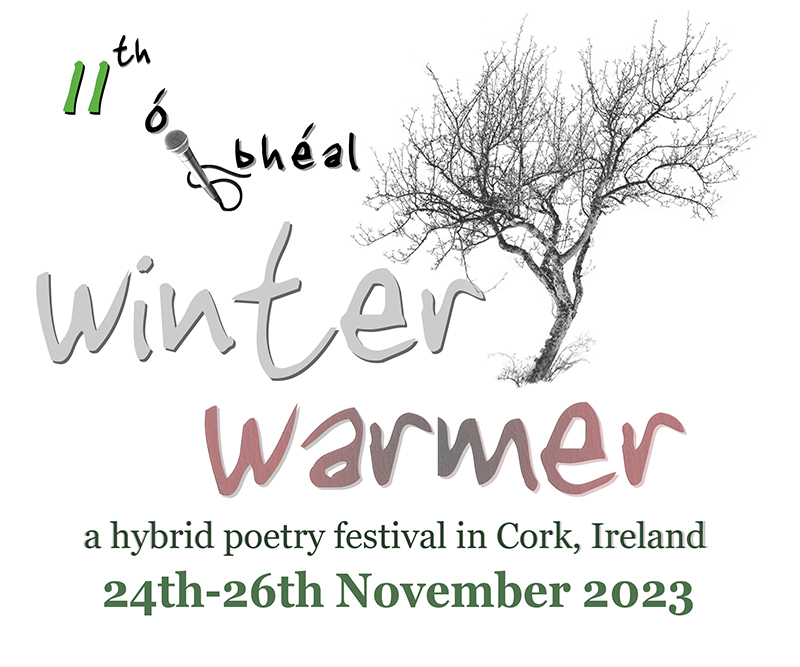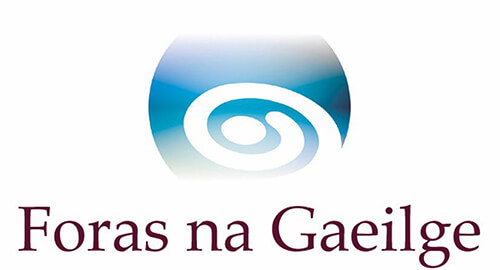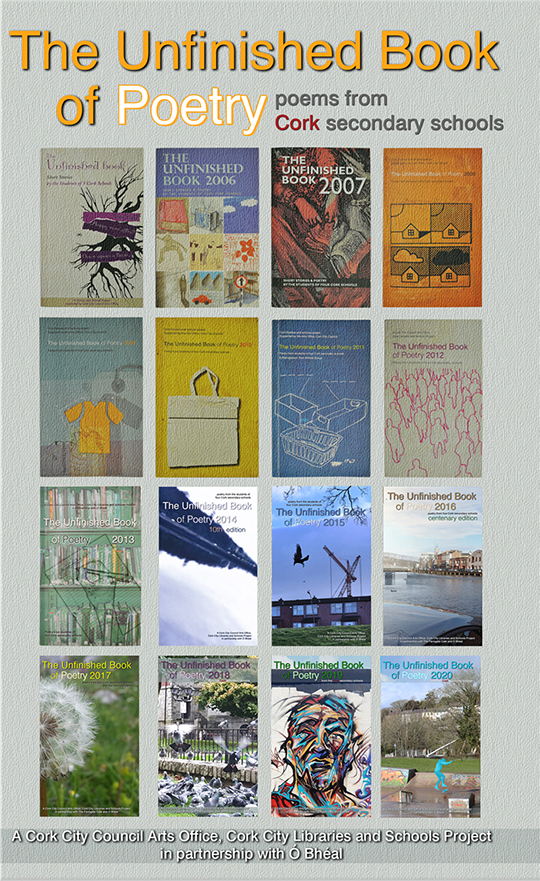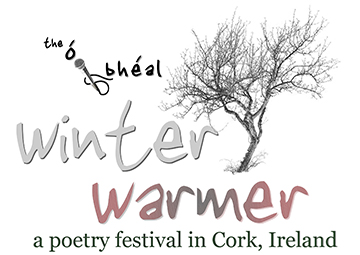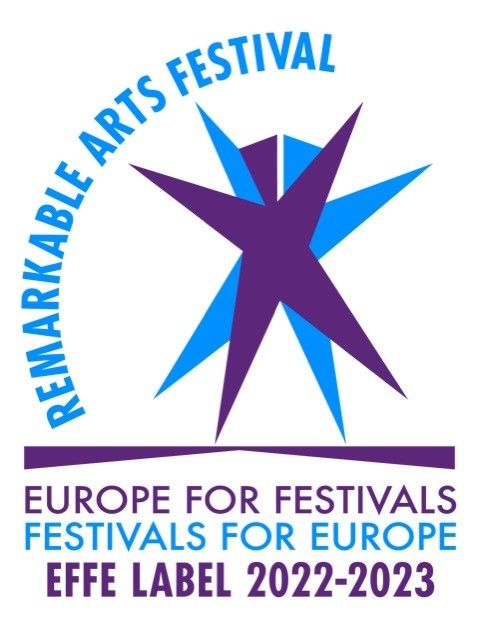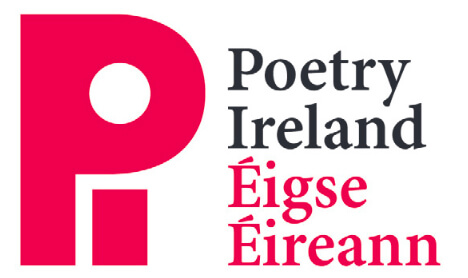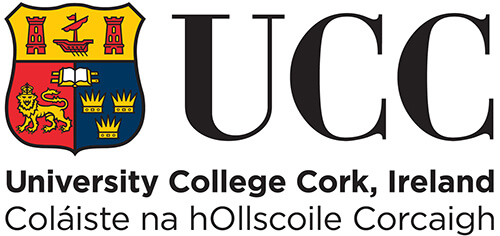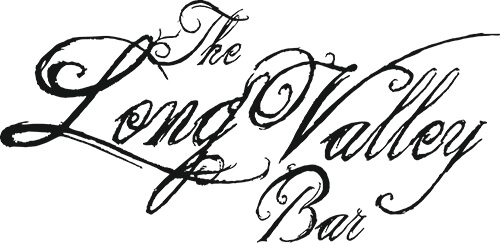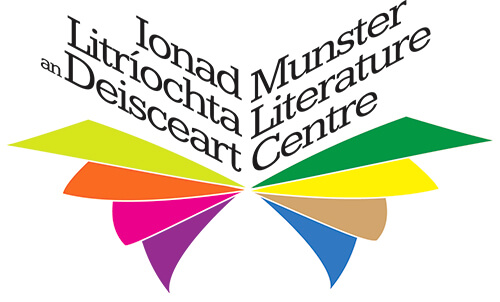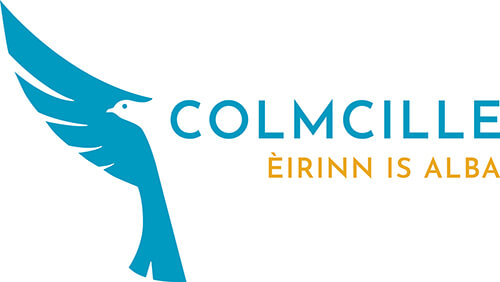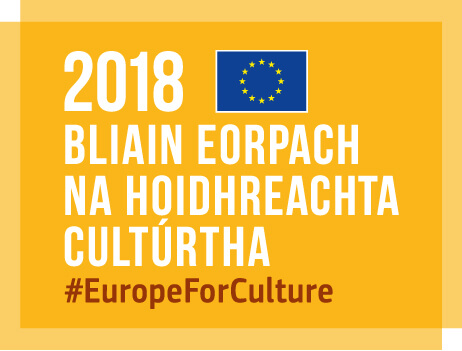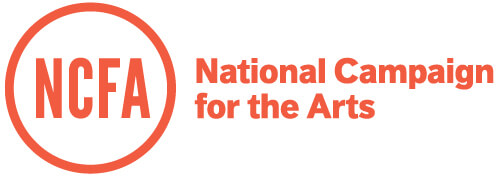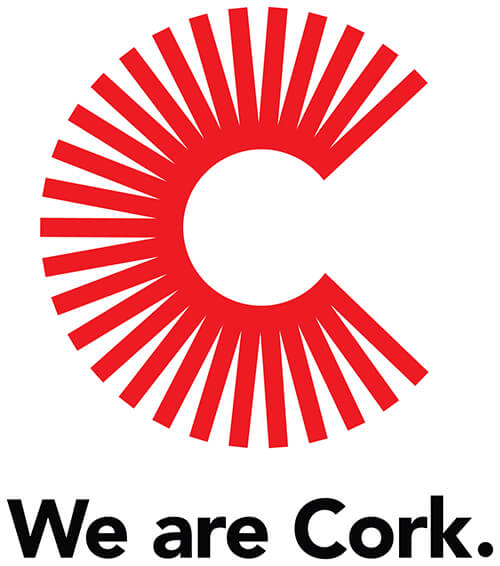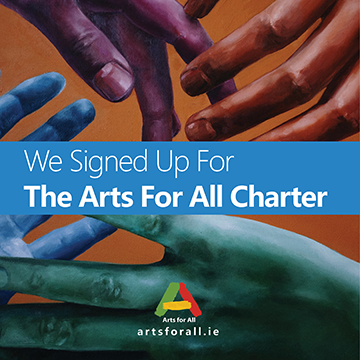
Submissions are now clósed
The shortlist will be announced during October 2024
The 2023 shortlist can be viewed here
(scroll down for guidelines & history)

Submissions are open from 1st May – 31st August 2024. Entries made outside of these dates cannot be considered. You may submit as many films as you like – each must interpret or convey a poem (present in its entirety, audibly and/or visually) and have been completed after the 1st of May 2022.
Entries may not exceed 10 minutes in duration. Non-English or non-Irish language films will require English subtitles.
The judges for 2024 are Colm Scully and Paul Casey. The shortlist will be announced during October 2024 and one overall winner will receive the Ó Bhéal award for best poetry-film. Shortlisted films will be screened (and the winner announced) at the 12th Winter Warmer poetry festival (22nd-24th Nov 2024).

Entries may be made free of charge via email to poetryfilm [at] obheal.ie – including the following info in an attached word document:
- Name and duration of Film
- Month & Year completed
- Name of Director
- Country of origin
- Email Address
- Name of Poet
- Name of Poem
- Synopsis
- Filmmaker biography
- and a Link to download a high-resolution version of the film.**
** If you are sending a vimeo or youtube link, etc, please ensure that the download button is enabled. All films not shortlisted by the judges are permanently deleted directly after the adjudication process.
Best of Luck!

Shortlisted films to date have also featured in Ó Bhéal’s poetry-film touring programme, at a number of international film and literary festivals, to date including the Clare Island Film Festival, Belfast Film Festival, Stanzas in Limerick, the Cyclops festival in Kiev, Poemaria in Vigo, the Madeira Literary Festival (2018), Salerno Letteratura (2018) and Cadence: Video Poetry Festival in Seattle (2019).
Ó Bhéal’s complete archive of shortlisted entries is screened throughout the year (in random), at the start of each physical Ó Bhéal poetry event.
From 2013-2019, Ó Bhéal’s Poetry-Film competition was part of the IndieCork film festival, with winners awarded the Ó Bhéal/IndieCork prize. We’re very grateful for these seven years of prosperity, an absolute privilege and pleasure to work with Úna Feely, Mick Hannigan and the IndieCork festival committee, sharing a vibrant and invaluable, spirited, enormously beneficial journey. A huge thank you to IndieCork. Ó Bhéal’s decision to meld the competition with its Winter Warmer festival in 2020 was partly logistical and partly to do with our bespoke submission process.
(most of the poetry films are embedded and viewable)
Poetry-Film Night 2012
Judges: Colm Scully and Paul Casey
The complete shortlist, including screenings, synopses and stills is here.
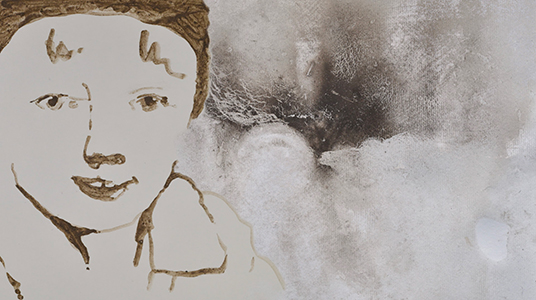
Poem: To Be Two
Synopsis – An origin story of becoming – two mothers, a son, a family. Bringing together the moments and the materials from the everyday, it focusses on the ways we, as a family formed through adoption, have made our bonds. To Be Two is a collage of video recordings, poetry, and animation painted with inks and dyes made from mud, rust, blackberries, nettle milk and river water gathered and adapted from my immediate and intimate surroundings. to describe how we imagine and manifest our selves through each other beyond the language of blood and DNA.

Director: Kate Sweeney (UK)
Kate Sweeney is an artist, video maker and writer based in the North East of England. Her video pieces have screened and been exhibited nationally and internationally including Sydney International Film Festival, Zebra Film Festival in Berlin, Manchester Animation Festival, AnimaTricks in Helsinki and International Poetry Festival in London. Kate is currently a research associate at Newcastle University, and has previously taught Fine Art, Animation and lectured in poetry-film. She has just completed her PhD exploring video practice in literary archives at Newcastle University, UK (2016 – 20).

“What struck us primarily was how the beauty of the words “richter white paint stroked through a candle/ time blown backwards by a brush” were as captivating as the visual journey of this film. The pacing was extraordinary, the stunning stop motion animation of a child on a pushbike coming towards you, and then you might have a sheet of white vellum paper just for a few moments, all under-layered with a child crying or laughing. One is transported into extraordinary shifts in perspective, via a striking variety of stylised animations and abstract videography. A fantastic and worthy winner. ”
Judges: Colm Scully and Paul Casey
The complete shortlist, including screenings, synopses and stills is here.
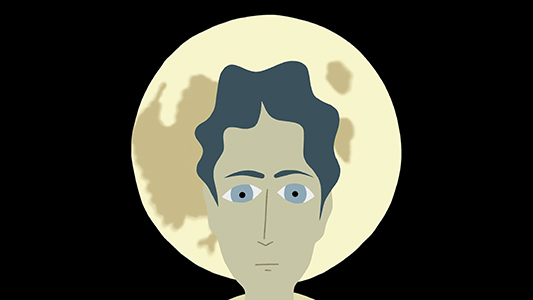
La luna asoma
(The moon appears)
(6:10)
Poem: La luna asoma (The moon appears)
by Federico García Lorca
Synopsis – An animated interpretation of the mysterious poem ‘La luna asoma’ by the Spanish poet Federico García Lorca.

Director: Jelle Meys (Belgium)
Jelle Meys (°1986) is a freelance illustrator and graphic designer, as well as a visual arts teacher, working and living in Sint-Niklaas, Belgium. He got his degree of ‘Master in visual arts: graphic design and illustration’ in 2009 at School of arts Ghent, in 2010 he also got his teacher’s degree there. In 2017 he started taking the film and animation course at the art academy in his home town Sint-Niklaas. Since finishing his work on ‘La luna asoma’, he started working on a new ambitious animation project under the work title of ‘Sally’, a comical story about a man and his unique relationship with a cactus.

“This haunting poem by Lorca is beautifully captured by Jelle in his subtle animation. Sticking with four pastel shades and manipulation of a few shapes only, he weds the mysteriousness of the words to the images in a surreal flow of visual ideas.
“Having tried my hand at animation myself, I know the work the work that goes into something like this.The guitar music and soundscape, like the perfectly timed crunch of an apple being bitten, weld it together. The film moves and grows as if a secret is unfolding before us. Its made all the more amazing when you read the credits and realise how few people Jelle needed help from in completing the project. It’s a worthy winner.”
“A gorgeous film. Image, music, voice and poem, gloriously wed.”
Judges: Paula Kehoe and Paul Casey
The complete shortlist, including screenings, synopses and stills is here.

What I fear most is becoming “a poet” (6:10)
Poem: What I fear most is becoming “a poet”
by Katerina Gogou
Synopsis – Katerina Gogou (1949-1993) was Greece’s greatest modern anarchist poetess. Her poems have become synonymous with the radical culture of Greece and with Exarcheia, the Athens neighbourhood known as the anarchist quarter. Born into the Nazi occupation of Greece, she lived through the years of far right military junta oppression and the country’s resurgent anarchist movement in the 1980s. An activist herself, she became a prophet of the movement and her poems anthems for it. She died of an overdose on 3 October 1993. This poetry film was produced by the Institute for Experimenal Arts and commissioned by the art platform filmpoetry.org, as part of the Digital Culture Programme, Ministry of Culture / Greece.

Director: Janet Lees (Isle of Man)
Janet Lees is an artist, poet and poetry filmmaker. Her film-based work has been selected for many festivals and screenings, including the Zebra Poetry Film Festival, the International Videopoetry Festival and the Aesthetica Art Prize. As an artist she has exhibited in group shows around the world. She represented the Isle of Man at the Festival Interceltique in France, with a full-scale solo exhibition of art photography, experimental film and poetry.
Janet’s own poetry is widely published and anthologised. She has had two books published: House of water, a collection of her poems and art photographs, and A bag of sky, the winning collection in the Frosted Fire Firsts prize hosted by the UK’s Cheltenham Poetry Festival.

“There were so many beautiful filmpoems entered into the competition, I loved watching every single one of them, and appreciated all of the work, imagination and innovation that went into making them. In the end, the piece called What I fear most is becoming a poet stood out as a stunning example of filmpoetry as a unique art form. Janet Lees has created a powerful visual rendering of Katerina Gogou’s poem. I was both floored and inspired by it. Comhghairdeas ó chroí!”
“This is such an evocative and moving piece. Katerina Gogou’s poem, enormous in itself which speaks so intimately about the poet’s world of peril and uncertainty, met with this filigreed balance of soft pianissimo and perfectly-paced typography, the haunting, completely captivating visuals, the almost hesitant text (in places), and the very absence of voice bringing us so much closer to the poet’s inner sanctum… all just masterfully done. A highly worthy winner.”
Judges: Dareina Ní Chinnéide and Paul Casey
The complete shortlist, including screenings, synopses and stills is here.
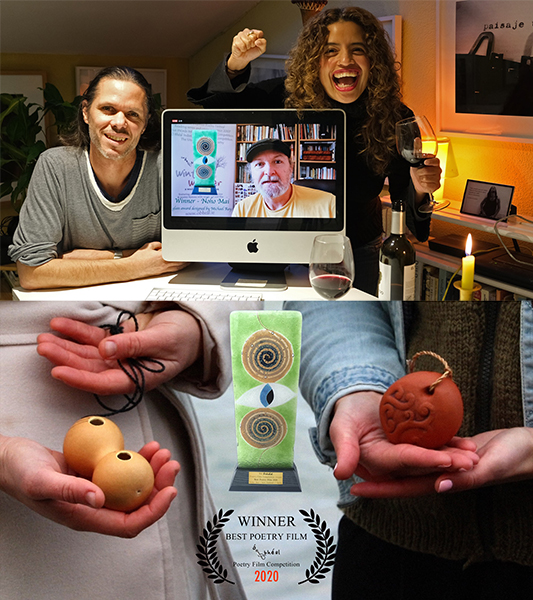
Noho Mai (5:33)
Poem: Noho Mai (Sit Here) by Peta-Maria Tunui
Synopsis – ‘Symbolized in the bird’s flight, a group of Māori, Pākehā and Colombian creatives explore life’s journey, the longing to return to the nest, and the life-giving connection with our ancestors.’
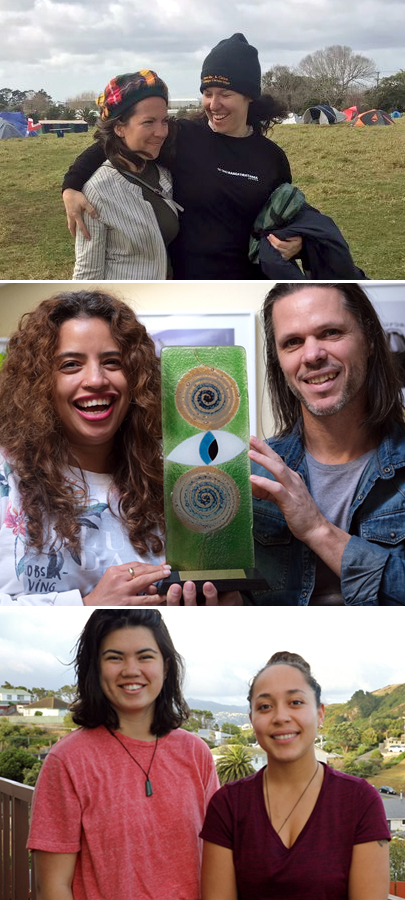
Directors: Peta-Maria Tunui, Waitahi Aniwaniwa McGee, Shania Bailey-Edmonds, Jesse-Ana Harris, Lilián Pallares, Charles Olsen (New Zealand / Spain)
The Directors’ Biographies are on the shortlist page.
“And so, I was drawn into this beautifully filmed, beautiful soundscape, delivered with a natural ease, the first time I watched all the wonderful poetry films submitted to this competition. The sparse lines of the poem ran along the wind of the film with powerful imagery. Strong but subtle. Neither the text, nor the image in the frame, collided – but fused together. The visual elements I was looking for were right there. The text of the poem was powering the vision in this beautiful language, I could not help but respond warmly to this film. It was a huge challenge to choose one overall winner in such a feast of poetry films, one which shone. This one did it for me. Congratulations all.”
“An absolutely stunning film. The finely wrought dance of words, visuals, music, pace and the dreamlike cadences of the Māori language. Noho Mai delivered everything I look for in a poetry film. A moving, beautiful poem and universal, timeless core of meaning which speaks also to our particularly detached and disconnected times. The filmmaking is a testament to the power of collaborative vision, crafted through the generous talents of six visual artists from New Zealand, Colombia and Spain. I would encourage any and all to relish this gleaming and worthy winner. An exquisite poetry film.”

Judges: Colm Scully and Stanley Notte
The complete shortlist with embedded films, synopses and stills is here.

Virginia gave me Roses (2:05)
Poem: Virginia gave me Roses by Lani O’Hanlon
Synopsis – A film exploring impermanence, female relationships and the rituals that sustain us in times of sorrow, loss and joy.

Director: Fiona Aryan (Ireland)
Fiona Aryan is an artist and filmmaker who likes to look at the beauty and magic that can be found in everyday life. ‘Going to the Well’, a poetry-film made with poet Lani O’Hanlon was shortlisted for the Ó Bhéal Poetry-Film competition in 2018. She is currently studying for a degree in film and TV production.

“… a soft-focused, memory-like family interaction that supports, compliments and, at the same time, adds weight to an original text that is both moving and strongly visual … transports the viewer into a dreamlike state where one is enveloped by the profound sense of love and safety which being in a close-knit family occasion provides.”
“… though an awful lot of the entries were beautifully filmed and made, not all of the poems were strong enough to carry their film. Virginia Gave me Roses immediately worked for me on first viewing, and only improved as I watched it again. The beauty of the poem was matched by the subtle imagining of the visual.”
Judges: Oonagh Kearney and Anamaría Crowe Serrano
The complete shortlist with embedded films, synopses and stills is here.

Accident de Personne (3:35)
Poem: Accident de Personne by Álvaro Martín
Synopsis – We create metaphors in order to mention facts we don’t want to talk about.

Director: Alvaro Martin (Spain)
Born in Valladolid, Spain, with a degree in Philosophy by the University of Salamanca, Álvaro Martín is interested in all kinds of art, especially in cinema and literature. In 2011 he created the movie production company Dream Zero Films (www.dreamzerofilms.com), he has directed several film shorts under that brand, like The Adorable Tenant (2013), Stockholm (2013), Disintegration (2014) or Cinema Roxy (2014).
“A thought-provoking, well-structured meditation on what it means to exist and to die by one’s own hand, to feel overwhelmingly alone in a word of endless connectivity. Serious issues are expertly raised in just 3.5 minutes, with deptively simple language.

Judges: Lani O’Hanlon and Shaun O’Connor
The complete shortlist with embedded films, synopses and stills is here.

Descrambled Eggs (4:14)
Poem: Descrambled Eggs by Steve Currie
Synopsis – Poetry, dance, and eggs collide in this short film by Canadian artist Kayla Jeanson. Poet Steve Currie grapples with the origins of his existence and limitations of his corporeality.

Director: Kayla Jeanson (Canada)
Kayla Jeanson is a Winnipeg-based filmmaker who specializes in producing screendance and work on the edge of documentary. A producer/director for her company Parachute Media Lab, she has developed a wide range of work including broadcast and commercial web video. She is also a trained contemporary dancer and choreographer.
“The standard across the board with the poetry films was incredibly high and we had a genuinely tough time making the final selection. There were lots of submissions with amazing visuals, but their respective poems were not crafted, featured tired language or had polemic and a tendency to preach. Others had well-crafted poetry but the film did not work with the poem. There were some very special ones where both poem and film were well crafted, edited, and worked together — and from these it was very hard to choose just one.
Kayla Jeanson’s Descrambled Eggs took both mediums into account and tells a bold, original, engaging and funny story. It’s a really entertaining piece and there are many small touches that demonstrate that the creators really put thought into the visuals and delivery of the poem while they were planning and shooting it. The poetry-film competition is about both mediums working together. With that in mind, the winner has made a huge effort to be a thoroughly cohesive piece with choreography, timing in camera, locations, props, performances etc.”

Judges: Kathy D’Arcy and Rossa Mullin
The complete shortlist with embedded films, synopses and stills is here.

Dictionary Illustrations (2:13)
Poem: Dictionary Illustrations by Sarah Sloat
Synopsis – Searching for a word, I set off browsing the dictionary illustrations.
Director: Marie Craven (Australia)

Marie Craven assembles short videos from poetry, music, voice and moving images by various artists around the world. Created via the internet, the pieces are collaborative in a way that belongs to the 21st century. Social networking and open media licensing are key to the process. Since 2014, Marie has put together many video poems, most often in association with The Poetry Storehouse and Pool creative group.
She has also collaborated for several years as a vocalist with electronic musicians globally, also via the internet. During the 1990s and early 2000s she wrote and directed short narrative and experimental films that were screened and awarded widely at international film festivals. Her earliest involvement in media was in the mid-1980s with super 8 film-making in Melbourne. For more about Marie, visit http://vimeo.com/mariecraven
“Dictionary Illustrations was a perfect film poem because, remembering it, we can’t distinguish which parts were the words, which the images, which the sounds: each element harmonised perfectly with the others to create one discrete artwork. This effect is so rare, and so rewarding.”

Judges: Patrick Cotter and Padraig Trehy
The complete shortlist with embedded films, synopses and stills is here.

Poem: In the Circus of You by Nicelle Davis
Synopsis – a visceral spectacle of controlled excess; it dismantles the three rings we use to contain our most domestic horrors and shows us the way through vulnerability to release. Nicelle Davis’s poetry mythologizes pain, makes grief, anger, disgust, and fear bearable by transforming them into finely wrought poems. These poems are filled with sharp edges, dissections, illusions, and images of flight; both in their language and in the ways they occupy the page. They are perfectly matched by the animation and drawings of Cheryl Gross, who translates Davis’s poetry into an equally grotesque, equally eloquent visual language.
Director: Cheryl Gross (U.S.A.)

Born and raised in Brooklyn, New York, Cheryl Gross is an illustrator and motion graphic artist living and working in the New York area. She is a professor at Pratt Institute and Bloomfield College.
“I equate my work with creating and building an environment, transforming my inner thoughts into reality. Beginning with the physical process, I work in layers. I am involved in solving visual and verbal complexities such as design and narrative. My urban influence has indeed added an ‘edge’ to my work.” Many have compared Cheryl’s work to “Dr. Seuss on crack.”
“Too many poetry films apply great cinematography to bad poetry and sometimes great poetry is left down by less than fully committed visuals. Here is a poetry film where the aesthetic accomplishment and craftmanship of the cinematography and the poetry are equal. Gross’s animation remains faithful to Davis’s text while not compromising its own ambition. Gross has demonstrated great taste and discernment in investing her talent as a cinematographer in poems which demand your attention with captivating subject matter and their awareness of language as a musical medium.”

Judges: Stephen O’Riordan, Rosie O’Regan, Paul Casey and Rab Urquhart
The complete shortlist with embedded films, synopses and stills is here.

Poem: Wadland by Marleen van der Werf
Synopsis – Wadland is a poetic wildlife documentary about the life in the sand of a tidal plain, and the search for a lost childhood memory.
Director: Marleen van der Werf (Netherlands)

After finishing her Masters in Biology and Philosophy at the University of Amsterdam, Marleen van der Werf specialized in filming nature.
www.marleenvanderwerf.com
“A sensitive and poignant study of an ecosystem by a filmmaker whose knowledge and appreciation of the subject matter shines in each finely crafted shot.” – Stephen O’Riordan
“Wadland invites us into a liminal landscape, to experience that intimate place where sea meets sand, where the strength and fragility of living is inhabited and washed away in tidal cycles. The imagery, beautifully captured is poetic in it’s own right, while the poem is heart felt and intelligent. Wadland is a true marriage of poetry and film.” – Rosie O’Regan
“Wadland comes pretty close to being a perfect poetry film.” – Rab Urquhart
“Exploring the metaphor of tidal-land sea-life as symbolic of our own lives, is both frightening and enlightening, and this delicate subject matter has been treated beautifully here. The balance between poem, image and music in Wadland is terrific and absolutely captivating. It does the best of what both poetry and film can do – it takes you somewhere new, within yourself.” – Paul Casey

Judges: Ó Bhéal Panel
The complete shortlist with embedded films, synopses and stills is here.

Poem: No País Dos Sacanas (In the Land of Bastards) by Manuel Vilarinho
Synopsis – No País Dos Sacanas (In the Land of Bastards): To be a crook and a half in the country of crooks? No, since everyone is, at least two.
Actor José Moreira and Director Manuel Vilarinho (Portugal)

Born in 1974, Manuel is a graduate in Tecnologia da Comunicação Audiovisual by IPP, Instituto Politecnico do Porto, in 2004. He directed several video clips for the music band, Fat Freddy during 2000 and 2003. In 2001 he won the FESTIVIDEO FILM FESTIVAL and the First Prize and Public award on OVAR VIDEO FILM FESTIVAL, with the short cut, LADROES. In 2004 he won the TAKE ONE prize at the International Video Festival of Vila de Conde, with AGUENTA, RAPAZ. During 2007 and 2011 he edited several TV programs. Manuel has worked at TVI, Independent Television in Portugal, since 2001.

